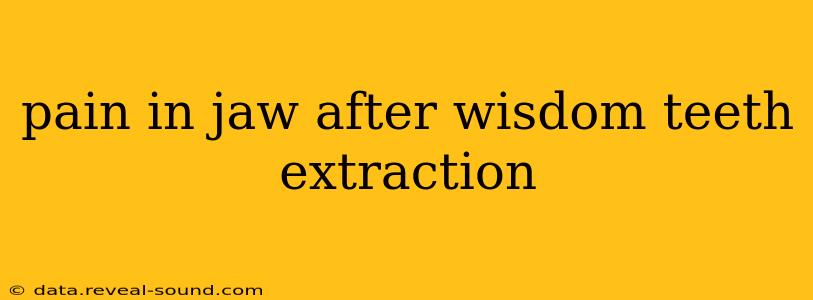Wisdom tooth extraction is a common procedure, but post-operative jaw pain is a frequent concern. Understanding the causes, managing the pain effectively, and knowing when to seek further medical attention are crucial for a smooth recovery. This comprehensive guide will address common questions and concerns surrounding jaw pain after wisdom tooth extraction.
What Causes Jaw Pain After Wisdom Teeth Extraction?
Jaw pain after wisdom teeth extraction is primarily due to the surgical trauma itself. The extraction process involves removing teeth and often bone, causing inflammation and swelling in the surrounding tissues. This inflammation puts pressure on nerves and muscles in the jaw, leading to pain. The severity of the pain varies greatly depending on the complexity of the extraction, the individual's pain tolerance, and the healing process. Other factors contributing to jaw pain can include:
- Inflammation: Swelling and inflammation are normal responses to surgery, but excessive inflammation can exacerbate pain.
- Dry Socket: This painful complication occurs when the blood clot protecting the extraction site dislodges, exposing the bone and nerves. It’s characterized by intense, throbbing pain, often radiating to the jaw.
- Nerve Damage: Although rare, nerve damage during extraction can cause prolonged or persistent jaw pain.
- Muscle Tension: The discomfort and recovery process can cause muscle tension in the jaw, leading to temporomandibular joint (TMJ) pain.
- Infection: While less common with proper aftercare, infection can cause severe pain and swelling in the jaw area.
How Long Does Jaw Pain Last After Wisdom Teeth Removal?
The duration of jaw pain varies significantly from person to person. Most people experience the most intense pain in the first few days after surgery, gradually decreasing over a week or two. Mild discomfort might persist for several weeks as the area heals completely. Factors influencing healing time include the complexity of the extraction, individual healing rates, and adherence to post-operative instructions.
What Can I Do to Relieve Jaw Pain After Wisdom Teeth Extraction?
Managing post-operative jaw pain involves a multi-pronged approach combining prescribed medications and self-care strategies:
- Follow Post-Operative Instructions: Your oral surgeon will provide specific instructions. Meticulously following these instructions is critical for minimizing complications and pain.
- Medication: Your surgeon will likely prescribe pain relievers, often narcotics in the initial days, followed by non-narcotic options as the pain subsides. Always take medication as directed.
- Ice Packs: Applying ice packs to the affected area for 15-20 minutes at a time, several times a day, can significantly reduce swelling and pain in the initial days.
- Rest: Adequate rest is crucial for healing. Avoid strenuous activities that could increase pain or bleeding.
- Soft Foods: Stick to a soft food diet for the first few days to avoid irritating the extraction sites. Examples include soups, mashed potatoes, yogurt, and applesauce.
- Gentle Rinsing: Gentle rinsing with saltwater can help keep the area clean and promote healing. Avoid vigorous rinsing that could dislodge the blood clot.
- Elevation: Keeping your head elevated while sleeping can help minimize swelling.
Is Jaw Pain After Wisdom Teeth Extraction Normal?
Some degree of jaw pain is entirely normal after wisdom teeth extraction. However, the intensity and duration of pain should be monitored. Severe, persistent pain, particularly accompanied by high fever, excessive swelling, or signs of infection (pus), warrants immediate medical attention.
When Should I See a Doctor About Jaw Pain After Wisdom Teeth Extraction?
Contact your oral surgeon or dentist immediately if you experience:
- Severe, persistent pain that isn't controlled by prescribed medication.
- Excessive swelling or bruising that worsens over time.
- High fever (101°F or higher).
- Signs of infection, such as pus or foul odor emanating from the extraction site.
- Difficulty opening your mouth (trismus).
- Numbness or tingling in the jaw or lower lip that persists.
How Can I Prevent Jaw Pain After Wisdom Teeth Extraction?
While you can't entirely prevent jaw pain, you can minimize its severity by following your surgeon's instructions diligently, maintaining good oral hygiene before and after the surgery, and communicating openly with your dentist about any concerns.
This information is for educational purposes only and should not be considered medical advice. Always consult with your dental professional for any concerns or questions regarding your specific situation. Remember, a proactive and informed approach to post-operative care can contribute significantly to a comfortable and successful recovery.
